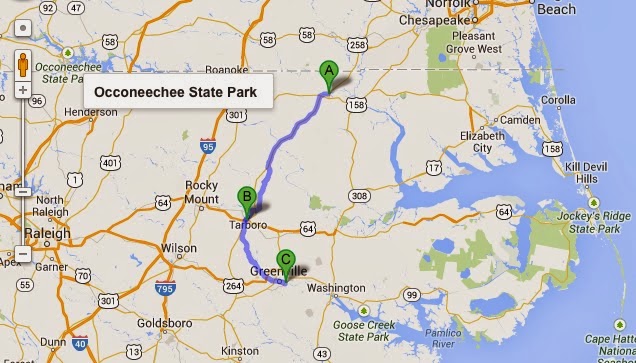When people drive everywhere, they don't think about the wind and what happens if the wind changes midway through their trips. But you know who does think a lot about wind? Birds! Birds must carefully determine what the wind is doing at any given moment, and they must make life-alterting decisions based upon what the wind might do in the future. A ruby-throated hummingbird migrating north across the Gulf of Mexico to the Louisiana coast must correctly assay wind conditions or risk becoming exhausted and drowning on the 500 mile, 20-hour flight. Many pelagic birds require wind to keep them aloft for extended periods of time. Without wind, foraging becomes very energetically expensive for them. The point is that wind is a huge deal for those of us traveling under our own power, and this is why I spend what I see as worthwhile time discussing it.
Trans-Gulf migration
Birdwise, today was rather quiet as might be expected given the weather. I did add Loggerhead shrike (#132) on a roadside wire this afternoon. One unexpected find was a group of 1,500 (rough estimate) Tundra swans in a roadside field just north of Tarboro. I have never seen this many Tundras swans in one place so this was a real surprise. They were a bit far back from the road, but I did manage to snap a shot of a portion of the group. If I knew I'd see these birds today, I might have rethought my decision to take that frigid, 16-mile detour to find a group of Tundra swans last week! However, this is how the big year game is played, and any chance I have to add a difficult bird to the list must be taken regardless of what may or may not happen in the future.
Tundra swans from today - click for bigger image
Tomorrow I am going to head towards New Bern and the Coast. The last few days in the interiors of Virginia and North Carolina have not been particularly birdy, but they have provided some interesting societal insights. For example, I have been riding through cotton fields for 3 straight days now. I have spent much time thinking about the ways, both good and bad, that this crop has influenced the course of US History. Cotton was incredibly important to the economy of 18th and 19th century America both as an export and a raw material for domestic textile mills. This crop, however, was probably the single biggest driver of the slave industry that extracted an immeasurable amount of unjust physical and emotional suffering from Africans and their African-American descendants. It is incredibly sobering to think about the human injustices that were perpetrated in the name of progress and profits. While we can never undo the past, hopefully we can use this history lesson to remind ourselves that no amount of economic gain should ever trump the respect and dignity with which we humans beings should treat one another.
I have also noticed a disturbing trend in many of the small towns through which I have traveled. Almost invariably, the largest street through each of these towns is called Main Street, and, again, almost invariably, this street looks as though it has seen better economic days. In one particular town, the only store on Main Street that wasn't boarded up was a Goodwill. I know there has been a lot of political talk of "Wall street versus Main street" in the last few years, and I know that smaller towns have had an increasingly more difficult time combating declining populations and associated economic challenges. However, as a recent resident of Boston and New York City, I did not exactly comprehend the severity of these problems until I actually biked through some of these towns. I understand that the economy has evolved to exist at the global scale in the past 30 years, but I can't help but wonder how many small towns like this have folded so as to feed the continually growing economic beast that is the 21st century. I wonder if there is anyway to restore these communities to their former selves.
Sorry for the historical, political, and society discourses, but with few birds and lots of time on the bike, the brain starts to work in mysterious ways. I just can't ignore my own eyes.




Hahaha. I thought you were going to say that people travelling by bicycle need to pay attention to the wind!
ReplyDeleteDorian I have also noticed that when I drive in a car, I pay almost no attention to the terrain - whether it is flat or I am going up a hill in a car, it matters little. However, on a bicycle, the terrain makes a big difference. I notice every uphill and downhill, and even a slight gradient makes a difference.
ReplyDeleteDorian - Glad to see that you made it through that rough patch of brutal weather and road conditions! Thanks for all your observations be they nature, bird, terrain, or societal. I just love hearing about what a person can see and experience when out and about pedaling! Looking forward to some great photography and anecdotes as you get on down the road!
ReplyDeleteI found out in some of my cross country trips that many small towns folded when a freeway was built nearby. That's where the motels and gas stations and restaurants were built at the exits thereby having any traffic that would normally flow through the town and stop bypass it and thereby forcing many business that depended on road traffic to shutter there doors. Progress??
ReplyDelete